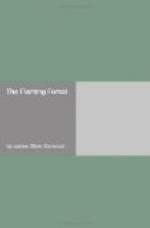A shadow of vexation crossed Marie-Anne’s face. “You seem in great haste.”
“Plagues and pests! You are right, Pretty Voice! I am most anxious to get back to my troubles there, and you—”
“Will also bid M’sieu Carrigan good-night,” she quickly interrupted him. “You will at least see me to my room, St. Pierre, and safely put away for the night.”
She held out her hand to David. There was not a tremor in it as it lay for an instant soft and warm in his own. She made no effort to withdraw it quickly, nor did her eyes hide their softness as they looked into his own.
Mutely David stood as they went out. He heard St. Pierre’s loud voice rumbling about the darkness of the night. He heard them pass along the side of the bateau forward, and half a minute later he knew that St. Pierre was getting into his canoe. The dip of a paddle came to him.
For a space there was silence, and then, from far out in the black shadow of the river, rolled back the great voice of St. Pierre Boulain singing the wild river chant, “En Roulant ma Boule.”
At the open window he listened. It seemed to him that from far over the river, where the giant raft lay, there came a faint answer to the words of the song,
XIX
With the slow approach of the storm which was advancing over the wilderness, Carrigan felt more poignantly the growing unrest that was in him. He heard the last of St. Pierre’s voice, and after that the fires on the distant shore died out slowly, giving way to utter blackness. Faintly there came to him the far-away rumbling of thunder. The air grew heavy and thick, and there was no sound of night-bird over the breast of the river, and out of the thick cedar and spruce and balsam there came no cry or whisper of the nocturnal life waiting in silence for the storm to break. In that stillness David put out the lights in the cabin and sat close to the window in darkness.
He was more than sleepless. Every nerve in his body demanded action, and his brain was fired by strange thoughts until their vividness seemed to bring him face to face with a reality that set his blood stirring with an irresistible thrill. He believed he had made a discovery, that St. Pierre had betrayed himself. What he had visioned, the conclusion he had arrived at, seemed inconceivable, yet what his own eyes had seen and his ears had heard pointed to the truth of it all. The least he could say was that St. Pierre’s love for Marie-Anne Boulain was a strange sort of love. His attitude toward her seemed more like that of a man in the presence of a child of whom he was fond in a fatherly sort of way. His affection, as he had expressed it, was parental and careless. Not for an instant had there been in it a betrayal of the lover, no suggestion of the husband who cared deeply or who might be made jealous by another man.




